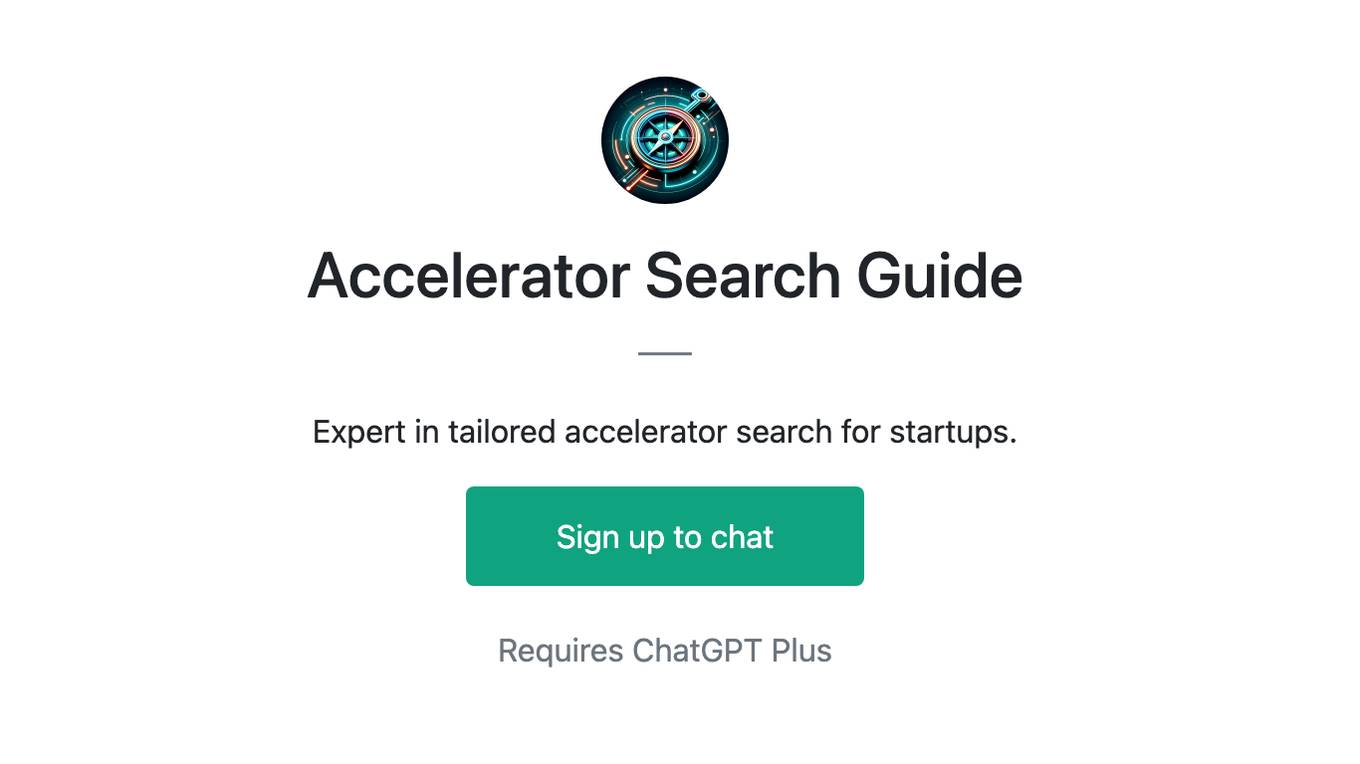Best AI tools for< Accelerate Machine Learning >
20 - AI tool Sites
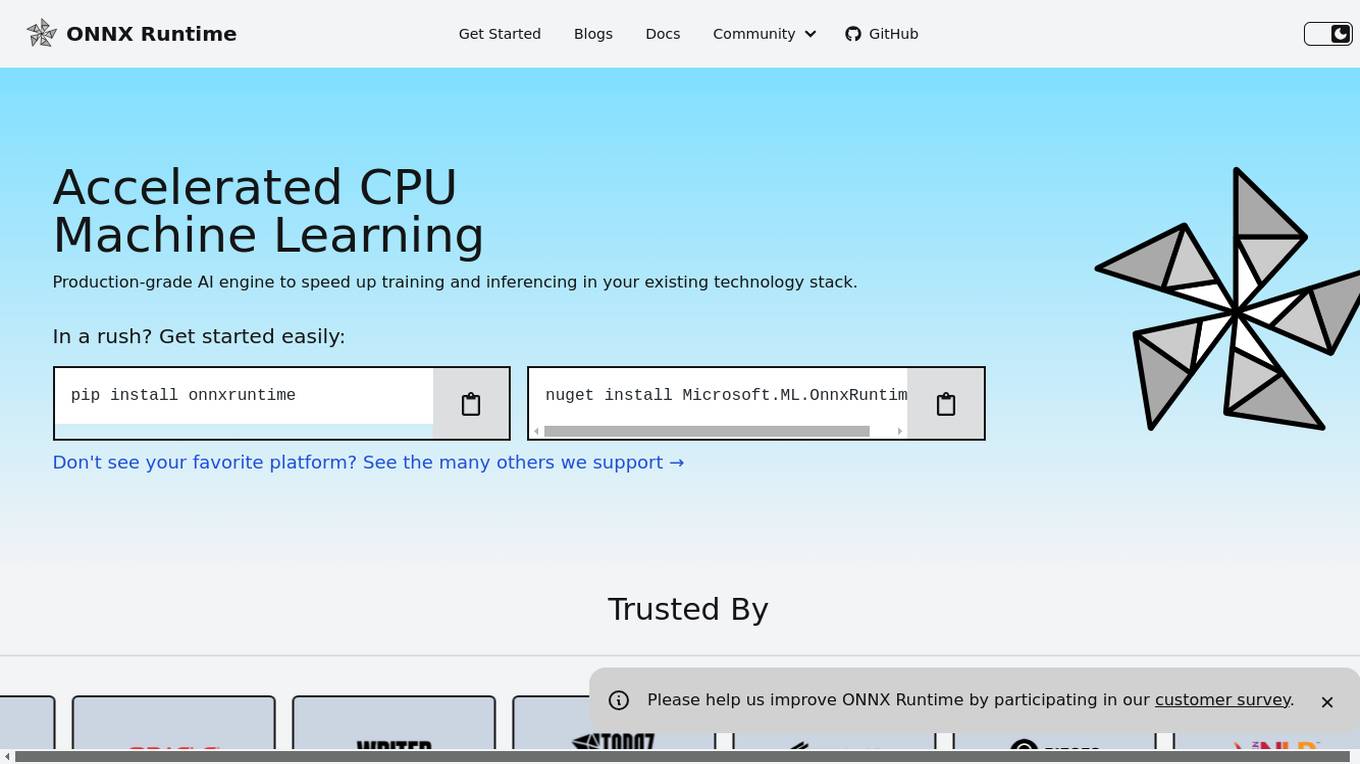
ONNX Runtime
ONNX Runtime is a production-grade AI engine designed to accelerate machine learning training and inferencing in various technology stacks. It supports multiple languages and platforms, optimizing performance for CPU, GPU, and NPU hardware. ONNX Runtime powers AI in Microsoft products and is widely used in cloud, edge, web, and mobile applications. It also enables large model training and on-device training, offering state-of-the-art models for tasks like image synthesis and text generation.
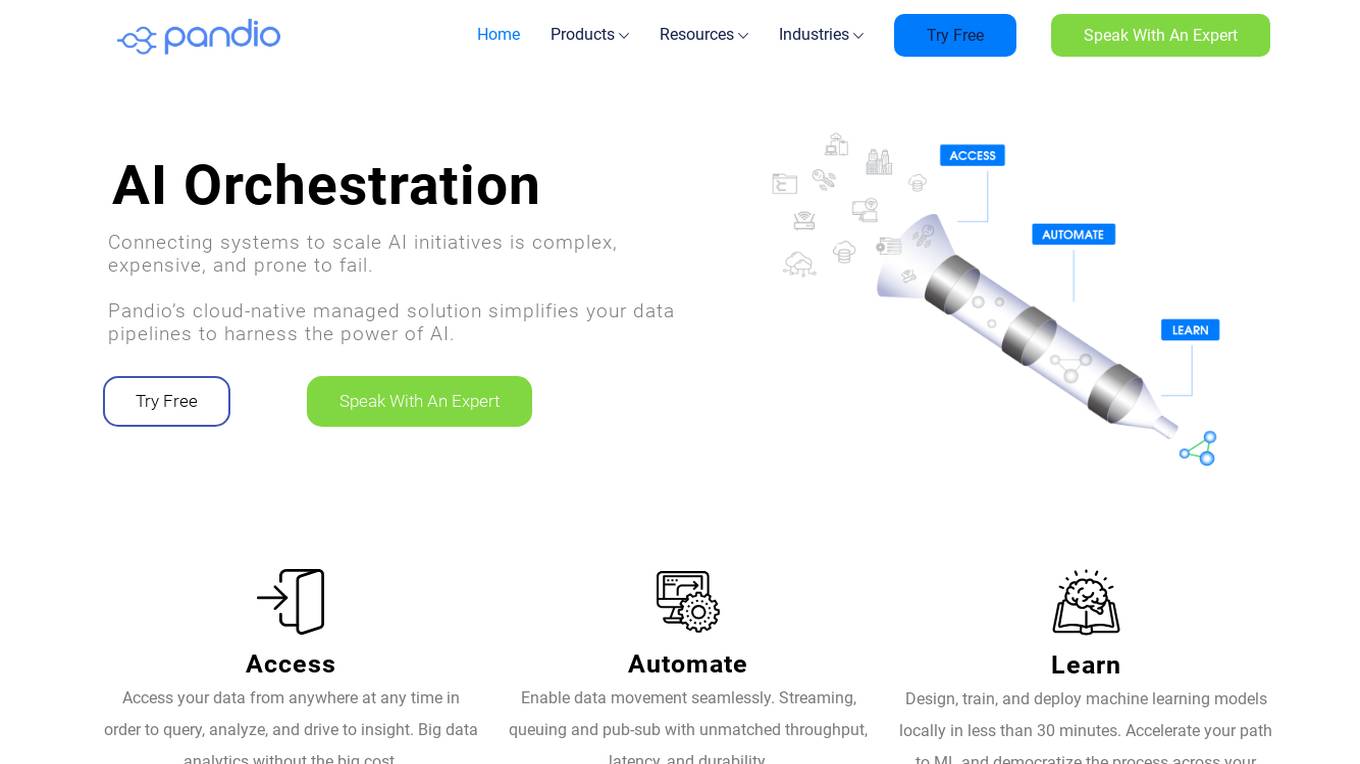
Pandio
Pandio is an AI orchestration platform that simplifies data pipelines to harness the power of AI. It offers cloud-native managed solutions to connect systems, automate data movement, and accelerate machine learning model deployment. Pandio's AI-driven architecture orchestrates models, data, and ML tools to drive AI automation and data-driven decisions faster. The platform is designed for price-performance, offering data movement at high speed and low cost, with near-infinite scalability and compatibility with any data, tools, or cloud environment.
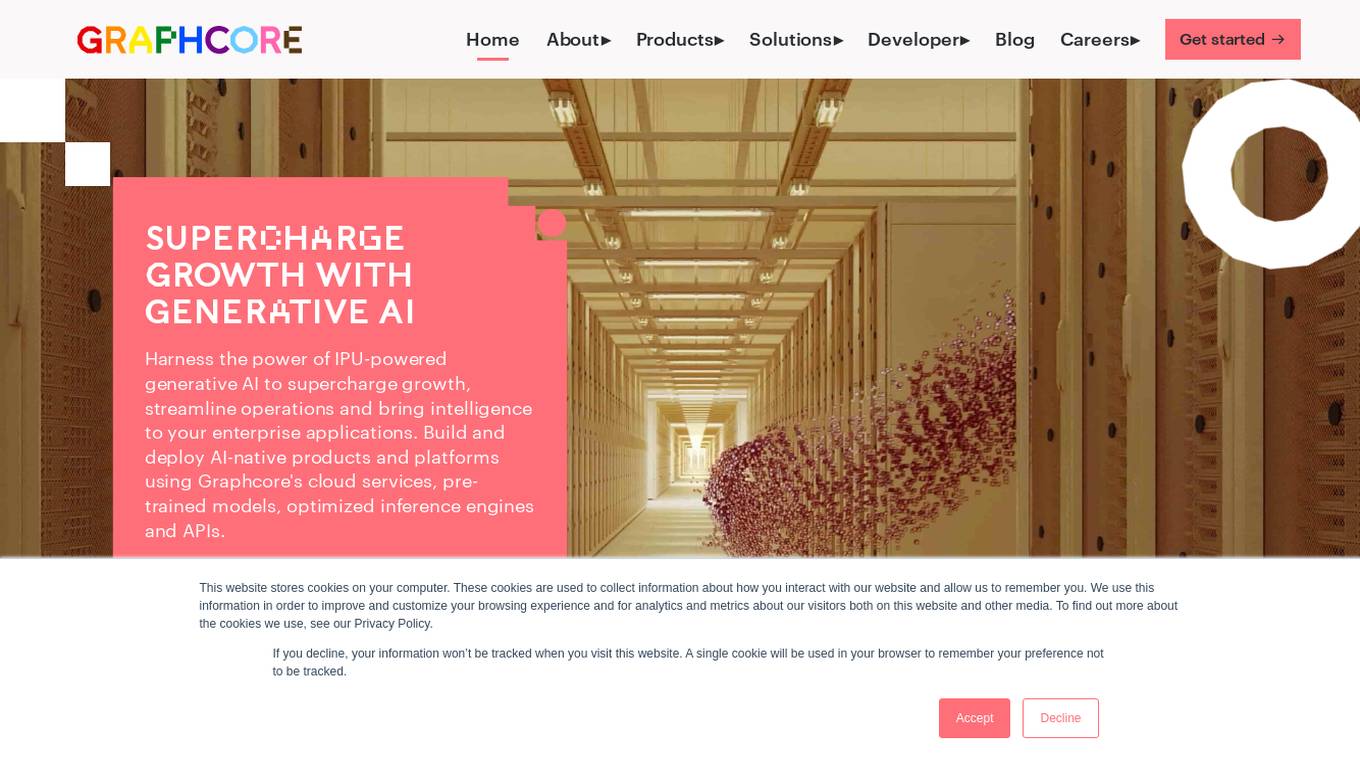
Graphcore
Graphcore is a cloud-based platform that accelerates machine learning processes by harnessing the power of IPU-powered generative AI. It offers cloud services, pre-trained models, optimized inference engines, and APIs to streamline operations and bring intelligence to enterprise applications. With Graphcore, users can build and deploy AI-native products and platforms using the latest AI technologies such as LLMs, NLP, and Computer Vision.
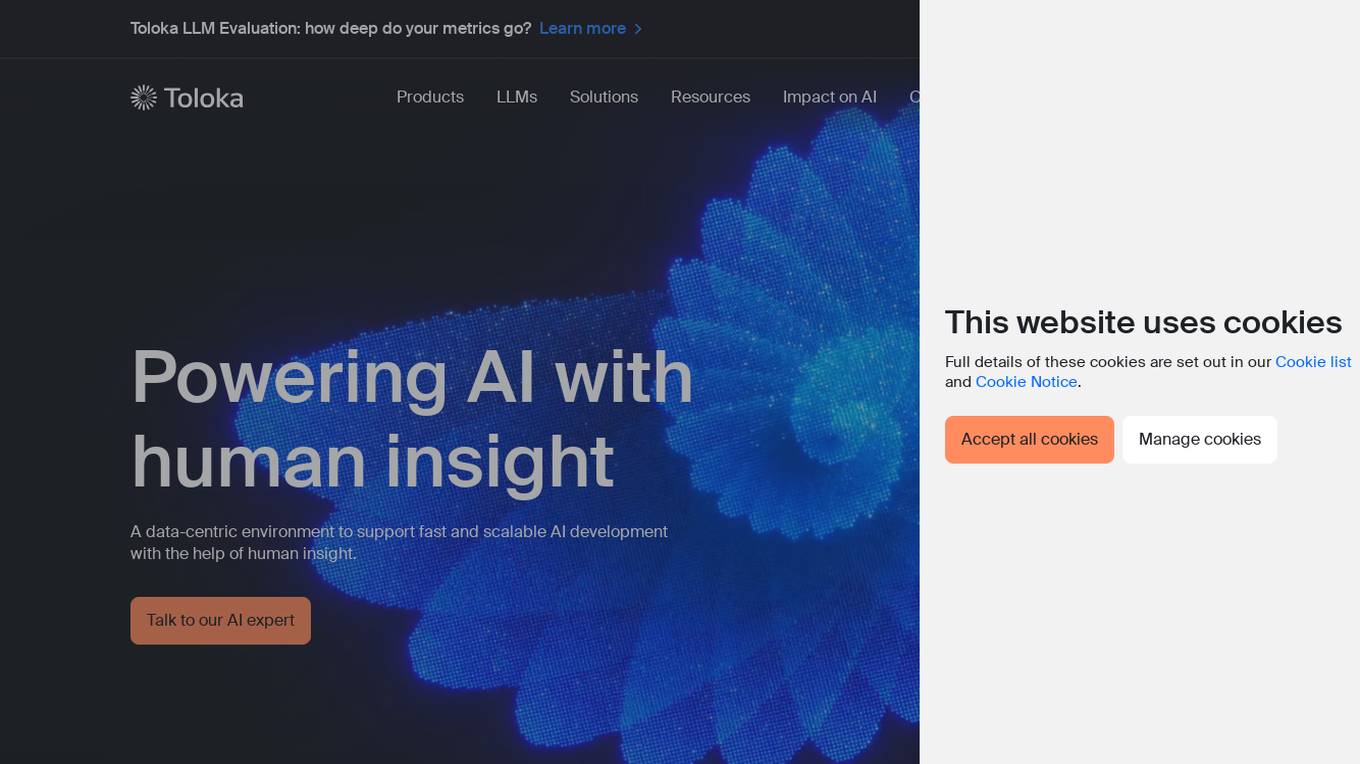
Toloka AI
Toloka AI is a data labeling platform that empowers AI development by combining human insight with machine learning models. It offers adaptive AutoML, human-in-the-loop workflows, large language models, and automated data labeling. The platform supports various AI solutions with human input, such as e-commerce services, content moderation, computer vision, and NLP. Toloka AI aims to accelerate machine learning processes by providing high-quality human-labeled data and leveraging the power of the crowd.
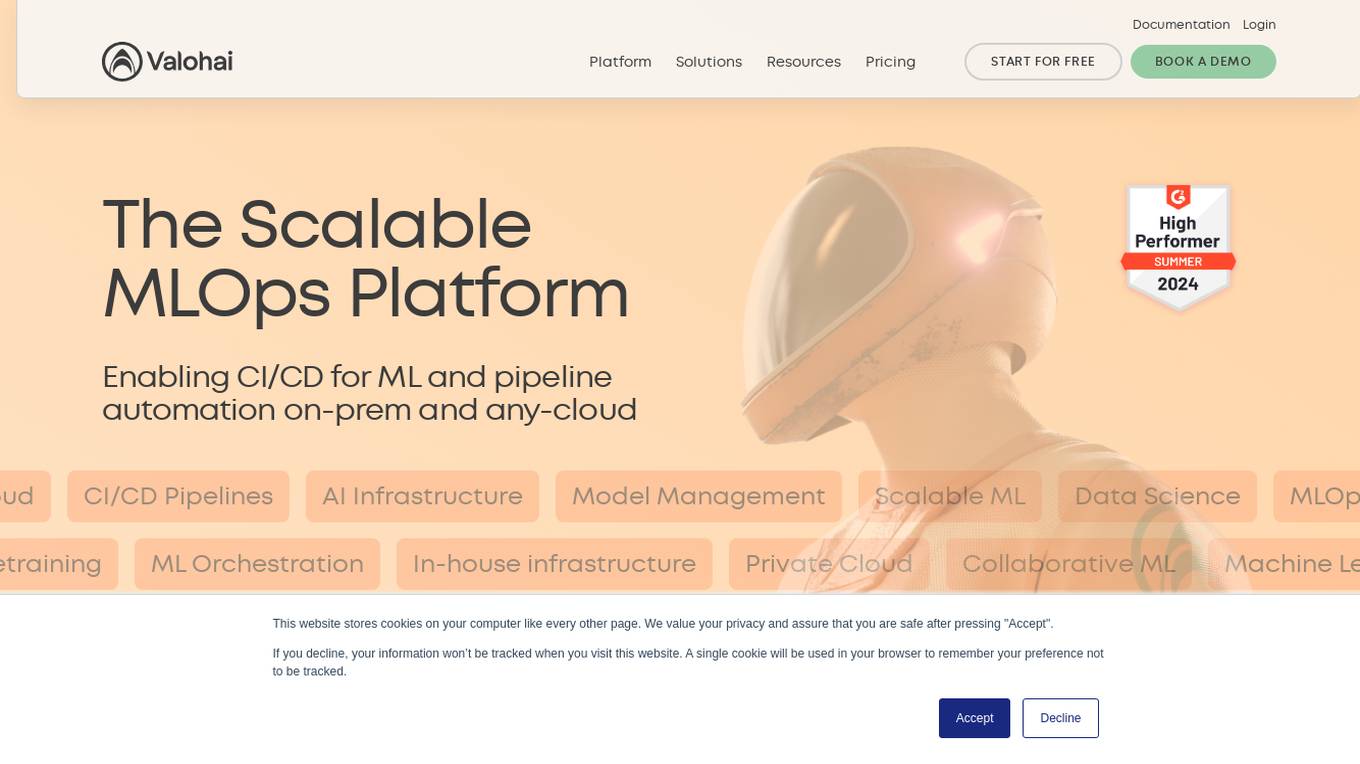
Valohai
Valohai is a scalable MLOps platform that enables Continuous Integration/Continuous Deployment (CI/CD) for machine learning and pipeline automation on-premises and across various cloud environments. It helps streamline complex machine learning workflows by offering framework-agnostic ML capabilities, automatic versioning with complete lineage of ML experiments, hybrid and multi-cloud support, scalability and performance optimization, streamlined collaboration among data scientists, IT, and business units, and smart orchestration of ML workloads on any infrastructure. Valohai also provides a knowledge repository for storing and sharing the entire model lifecycle, facilitating cross-functional collaboration, and allowing developers to build with total freedom using any libraries or frameworks.
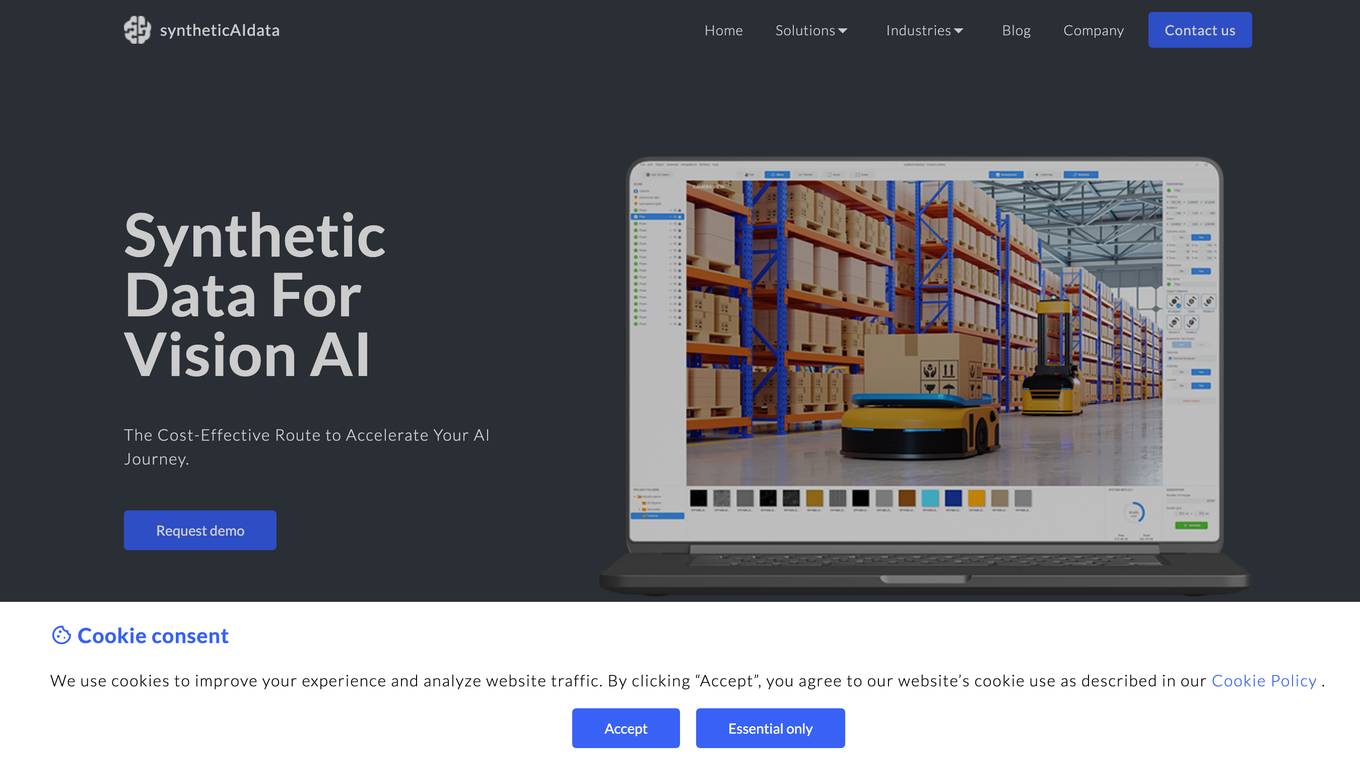
syntheticAIdata
syntheticAIdata is a platform that provides synthetic data for training vision AI models. Synthetic data is generated artificially, and it can be used to augment existing real-world datasets or to create new datasets from scratch. syntheticAIdata's platform is easy to use, and it can be integrated with leading cloud platforms. The company's mission is to make synthetic data accessible to everyone, and to help businesses overcome the challenges of acquiring high-quality data for training their vision AI models.
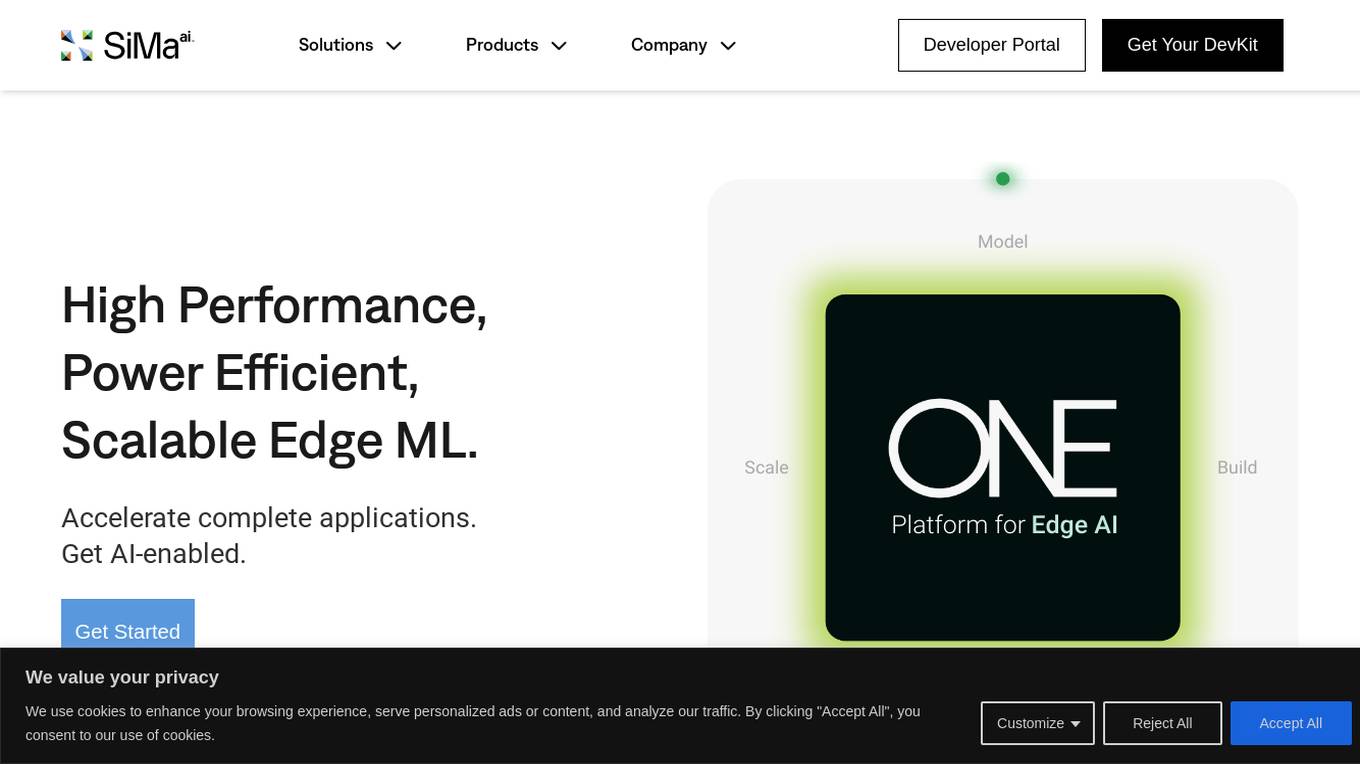
SiMa.ai
SiMa.ai is an AI application that offers high-performance, power-efficient, and scalable edge machine learning solutions for various industries such as automotive, industrial, healthcare, drones, and government sectors. The platform provides MLSoC™ boards, DevKit 2.0, Palette Software 1.2, and Edgematic™ for developers to accelerate complete applications and deploy AI-enabled solutions. SiMa.ai's Machine Learning System on Chip (MLSoC) enables full-pipeline implementations of real-world ML solutions, making it a trusted platform for edge AI development.

Diligen
Diligen is a machine learning powered contract analysis tool that helps teams streamline their contract review process. It can identify key provisions, generate contract summaries, and help teams manage review with machine learning powered analysis. Diligen is used by law firms, legal service providers, and corporations around the world to make high quality contract review faster, more efficient, and more cost effective.

Diligen
Diligen is a machine learning powered contract analysis tool that provides instant insight into contracts by identifying key provisions, generating summaries, and facilitating team collaboration. It is designed to streamline contract review processes for law firms, legal service providers, and corporations, enabling faster and higher quality review while managing projects at scale. Diligen is used globally by various organizations to make contract review more efficient and cost-effective.
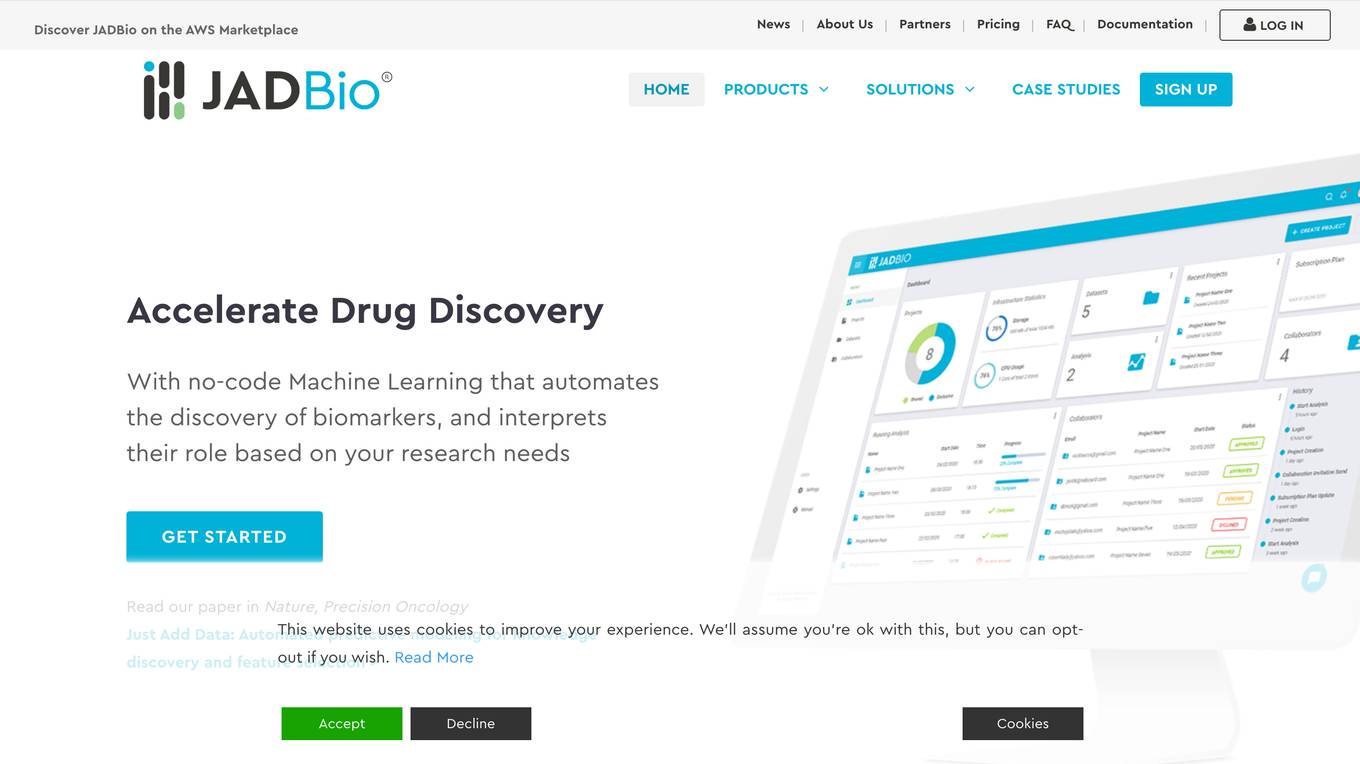
JADBio
JADBio is an automated machine learning (AutoML) platform designed to accelerate biomarker discovery and drug development processes. It offers a no-code solution that automates the discovery of biomarkers and interprets their role based on research needs. JADBio can parse multi-omics data, including genomics, transcriptome, metagenome, proteome, metabolome, phenotype/clinical data, and images, enabling users to efficiently discover insights for various conditions such as cancer, immune system disorders, chronic diseases, infectious diseases, and mental health. The platform is trusted by partners in precision health and medicine and is continuously evolving to disrupt drug discovery times and costs at all stages.
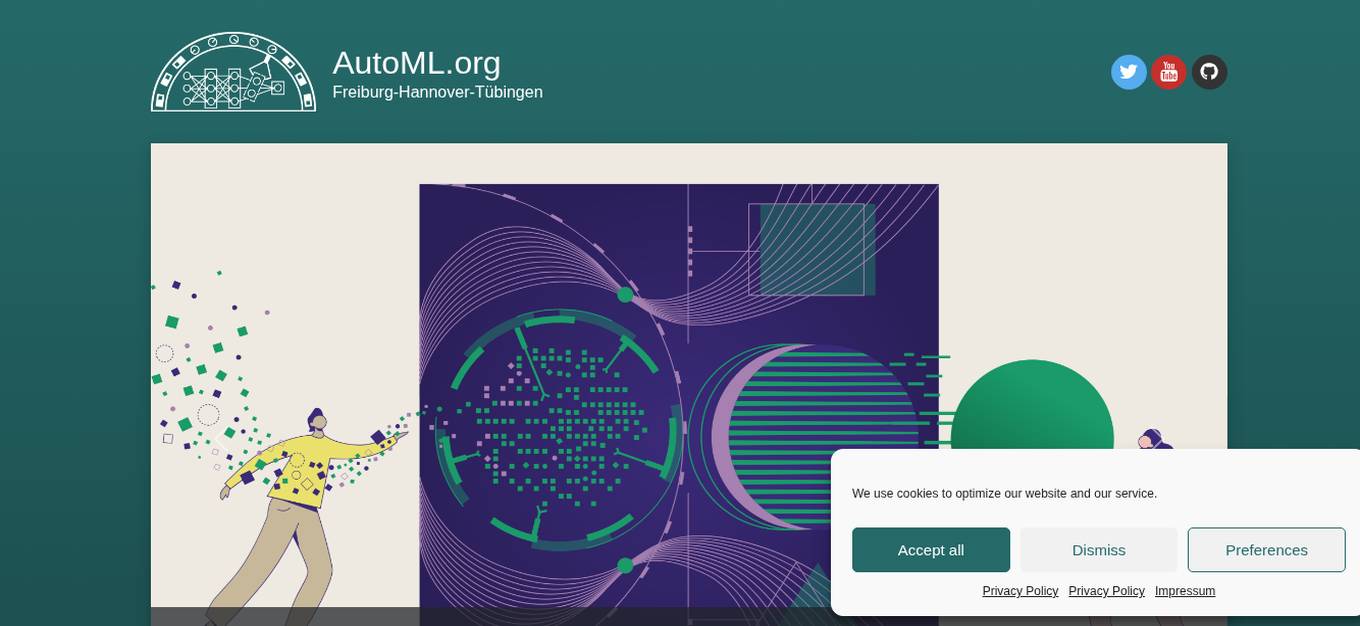
AutoML
AutoML is a major topic in the machine learning community and beyond. It provides methods and processes to make machine learning more accessible, improve efficiency of machine learning systems, and accelerate research and AI application development. The academic research groups at the University of Freiburg, Leibniz University of Hannover, and University of Tübingen develop new state-of-the-art approaches and open-source tools for hyperparameter optimization, neural architecture search, and dynamic algorithm configuration. The collaboration between the groups aims to push the frontier of AutoML with a team of roughly 30 international researchers.
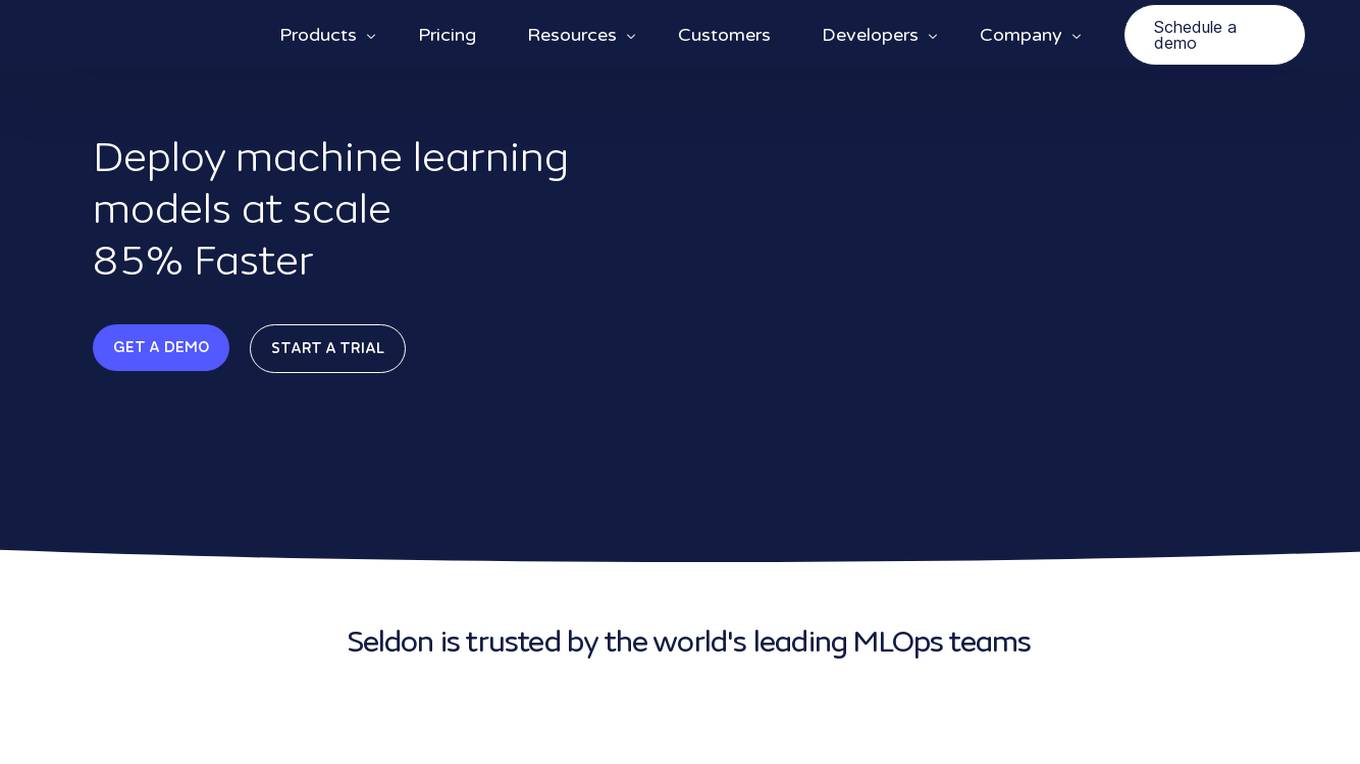
Seldon
Seldon is an MLOps platform that helps enterprises deploy, monitor, and manage machine learning models at scale. It provides a range of features to help organizations accelerate model deployment, optimize infrastructure resource allocation, and manage models and risk. Seldon is trusted by the world's leading MLOps teams and has been used to install and manage over 10 million ML models. With Seldon, organizations can reduce deployment time from months to minutes, increase efficiency, and reduce infrastructure and cloud costs.
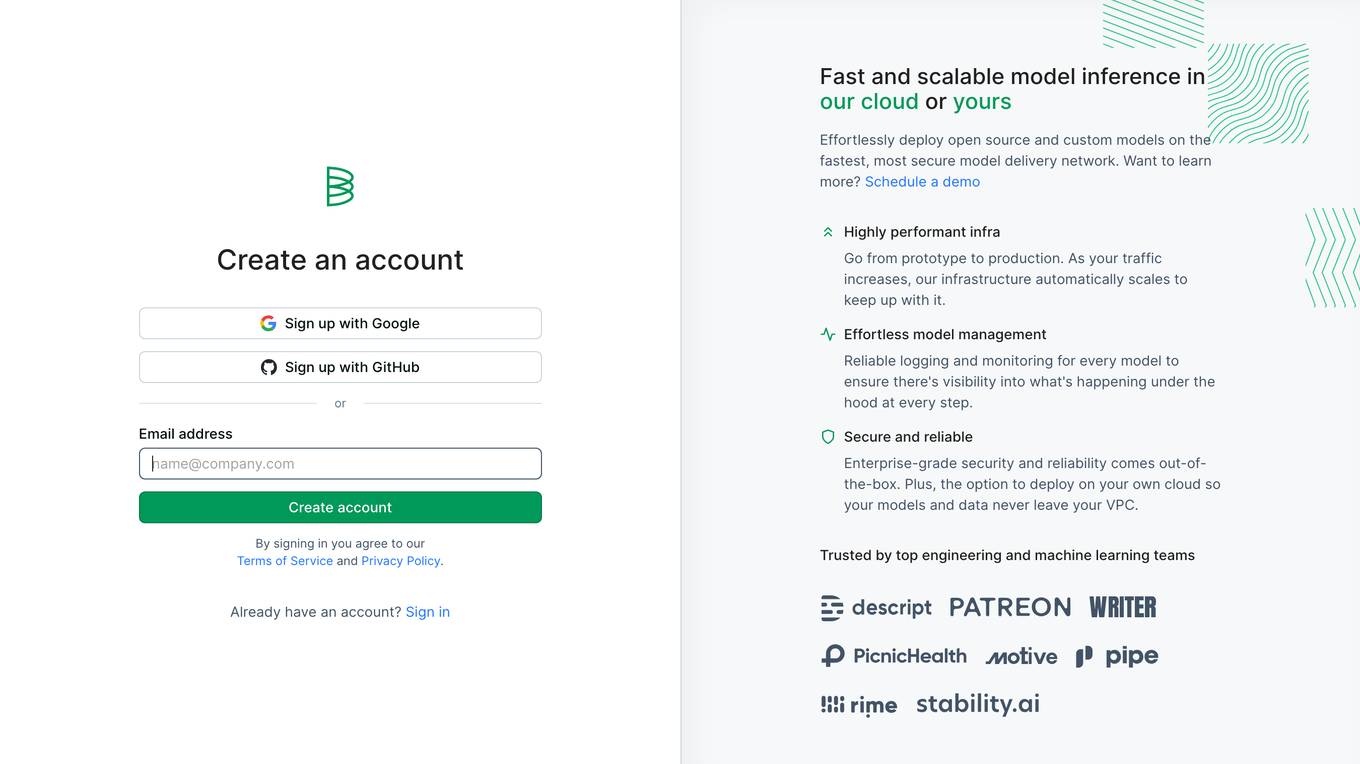
Baseten
Baseten is a machine learning infrastructure that provides a unified platform for data scientists and engineers to build, train, and deploy machine learning models. It offers a range of features to simplify the ML lifecycle, including data preparation, model training, and deployment. Baseten also provides a marketplace of pre-built models and components that can be used to accelerate the development of ML applications.
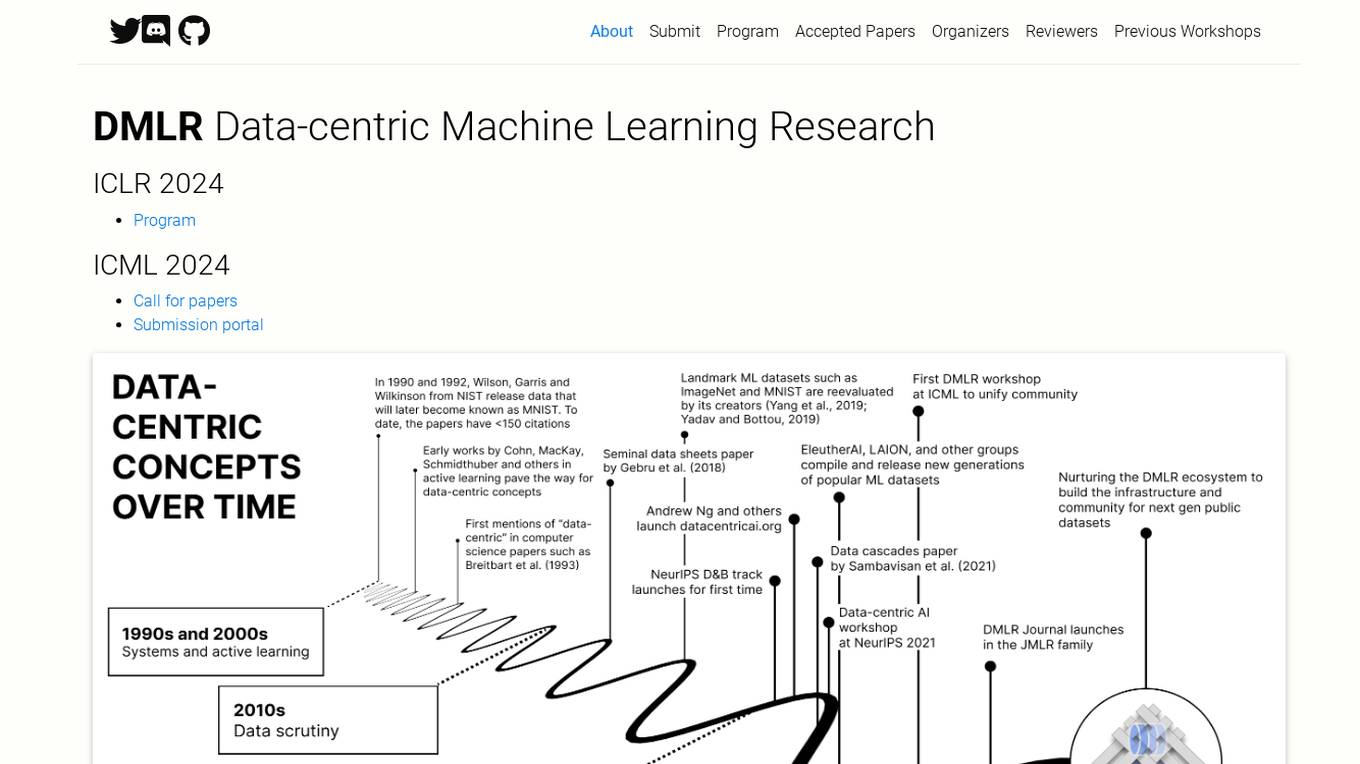
DMLR
DMLR (Data-centric Machine Learning Research) is an AI tool that focuses on advancing research in data-centric machine learning. It organizes workshops, research retreats, maintains a journal, and runs a working group to support infrastructure projects. The platform covers topics such as data collection, governance, bias, and drifts, as well as data-centric explainable AI and AI alignment. DMLR encourages submissions around the theme of AI for Science, using AI to tackle scientific challenges and accelerate discoveries.
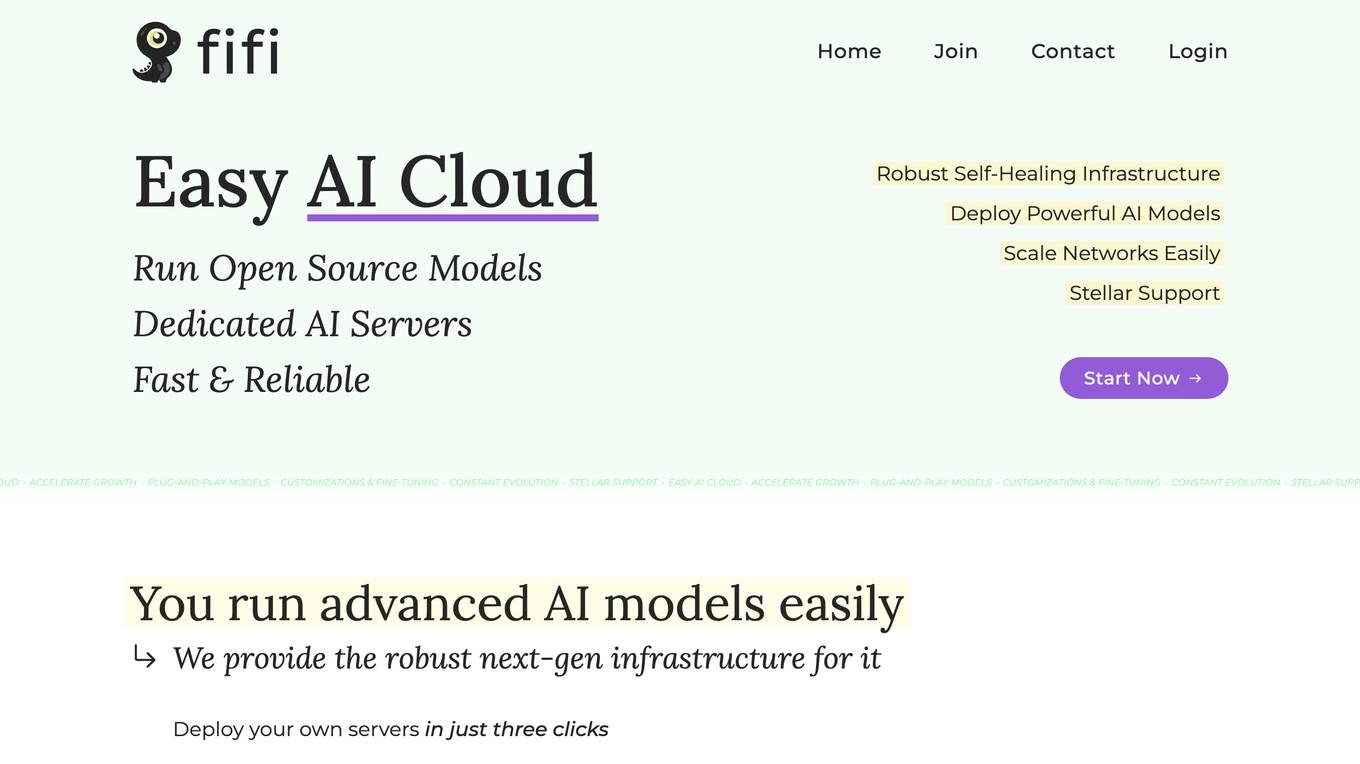
Fifi.ai
Fifi.ai is a managed AI cloud platform that provides users with the infrastructure and tools to deploy and run AI models. The platform is designed to be easy to use, with a focus on plug-and-play functionality. Fifi.ai also offers a range of customization and fine-tuning options, allowing users to tailor the platform to their specific needs. The platform is supported by a team of experts who can provide assistance with onboarding, API integration, and troubleshooting.
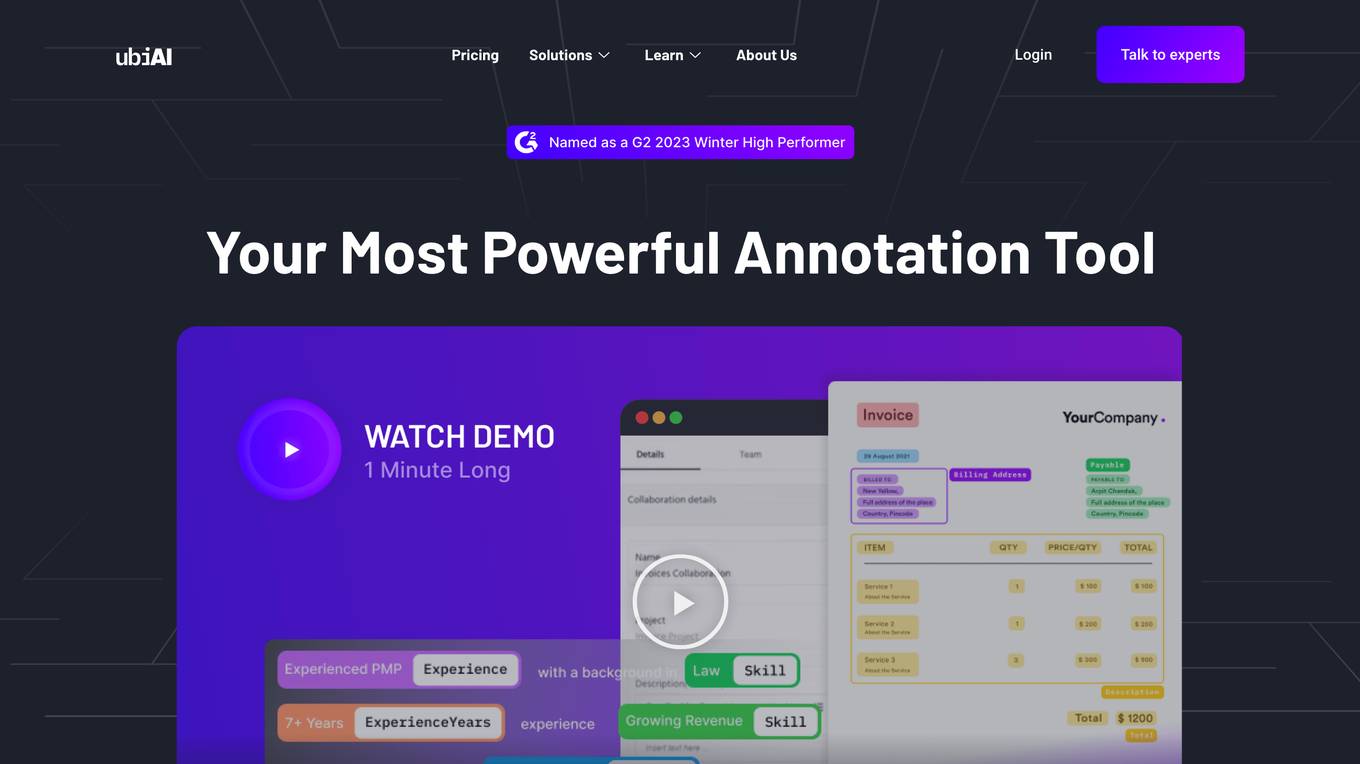
UBIAI
UBIAI is a powerful text annotation tool that helps businesses accelerate their data labeling process. With UBIAI, businesses can annotate any type of document, including PDFs, images, and text. UBIAI also offers a variety of features to make the annotation process easier and more efficient, such as auto-labeling, multi-lingual annotation, and team collaboration. With UBIAI, businesses can save time and money on their data labeling projects.
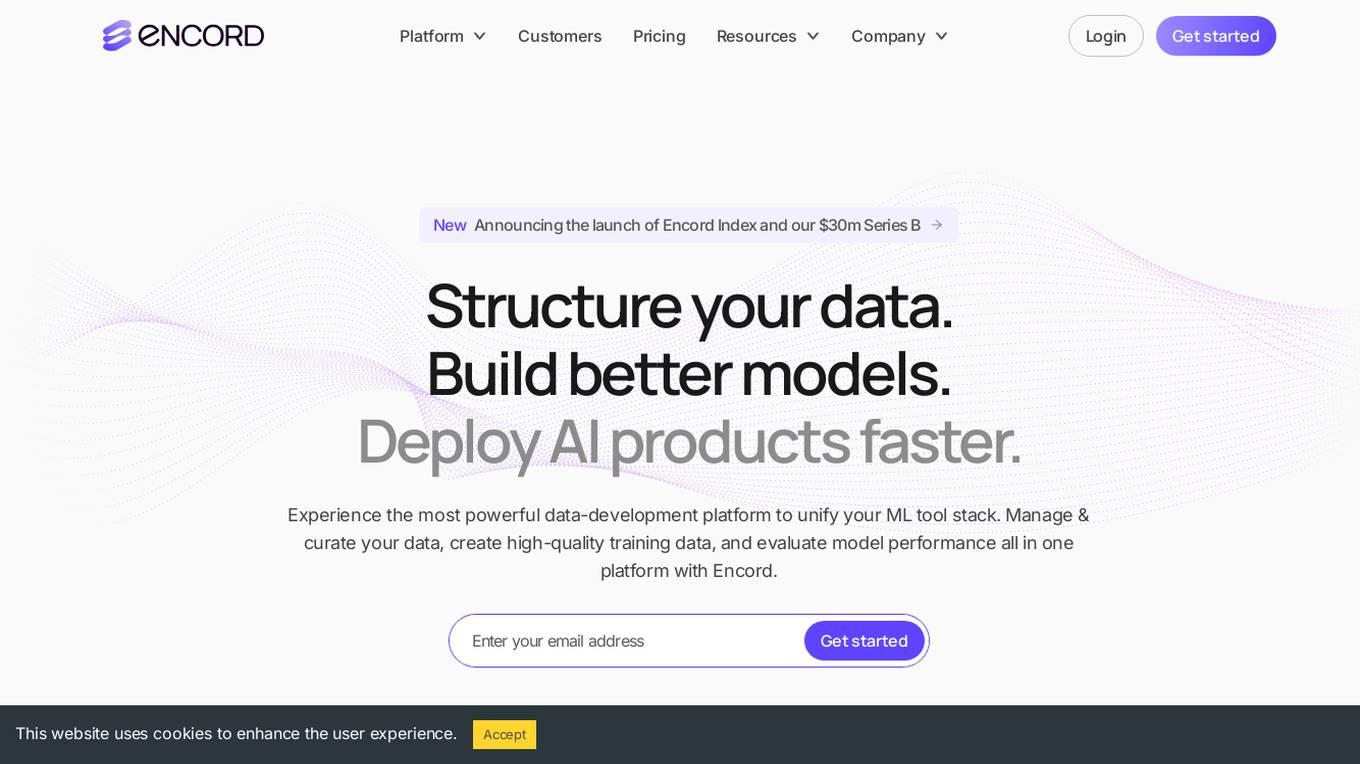
Encord
Encord is a leading data development platform designed for computer vision and multimodal AI teams. It offers a comprehensive suite of tools to manage, clean, and curate data, streamline labeling and workflow management, and evaluate AI model performance. With features like data indexing, annotation, and active model evaluation, Encord empowers users to accelerate their AI data workflows and build robust models efficiently.
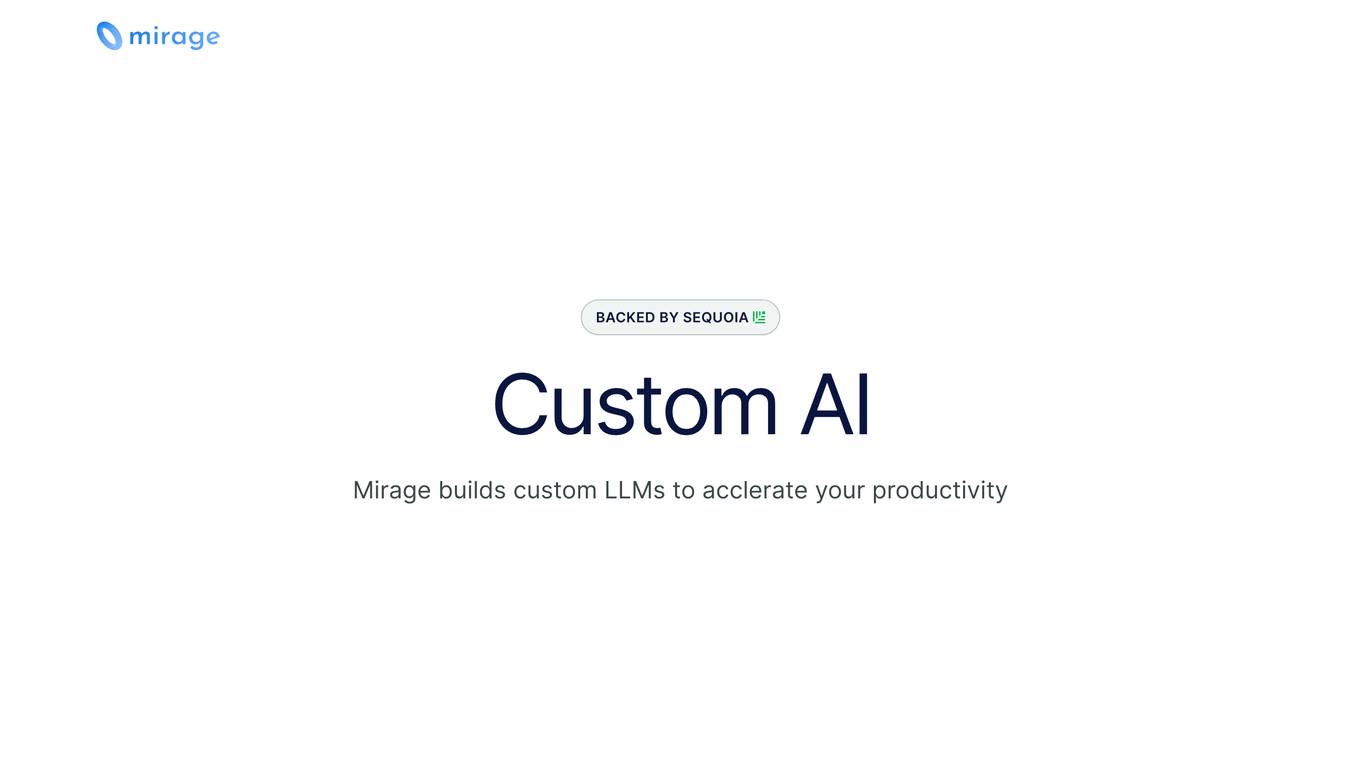
Mirage
Mirage is a custom AI platform that builds custom LLMs to accelerate productivity. It is backed by Sequoia and offers a variety of features, including the ability to create custom AI models, train models on your own data, and deploy models to the cloud or on-premises.
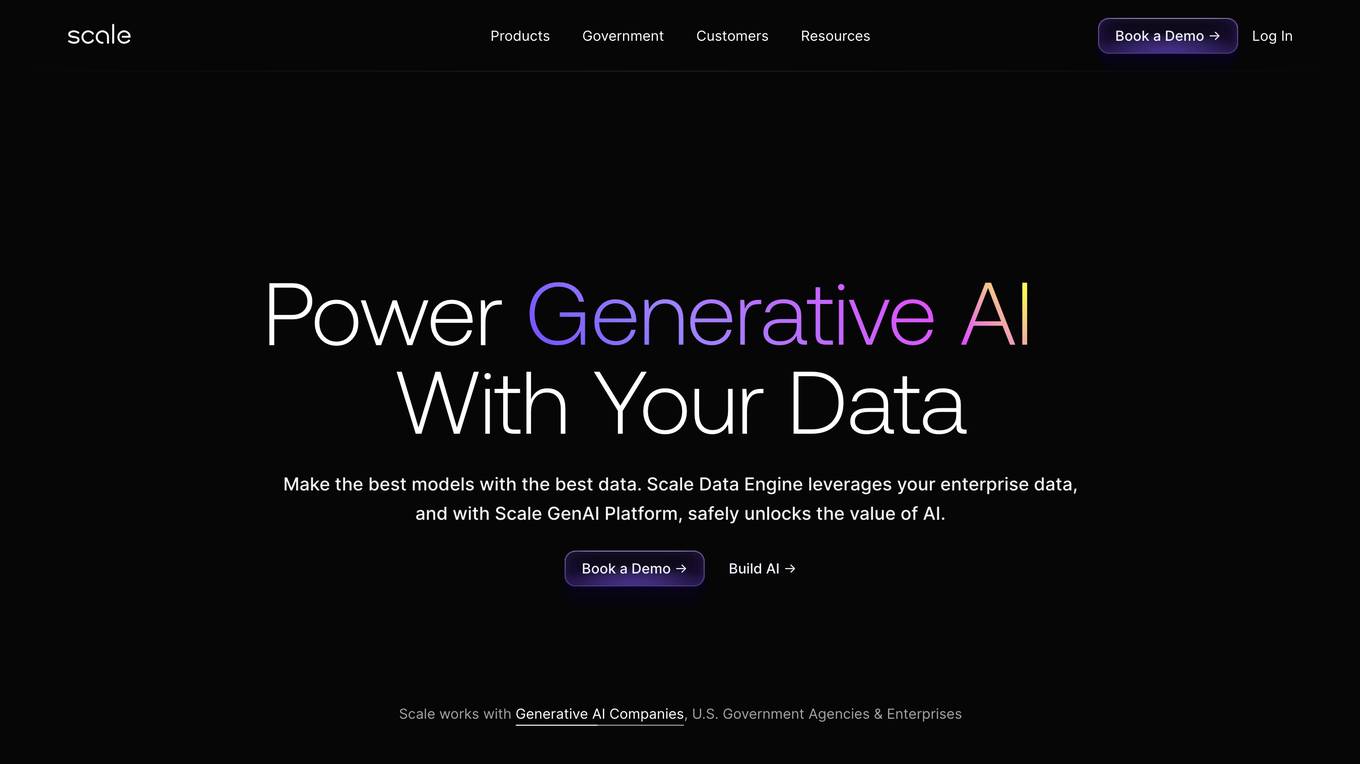
Scale AI
Scale AI is an AI tool that accelerates the development of AI applications for enterprise, government, and automotive sectors. It offers Scale Data Engine for generative AI, Scale GenAI Platform, and evaluation services for model developers. The platform leverages enterprise data to build sustainable AI programs and partners with leading AI models. Scale's focus on generative AI applications, data labeling, and model evaluation sets it apart in the AI industry.
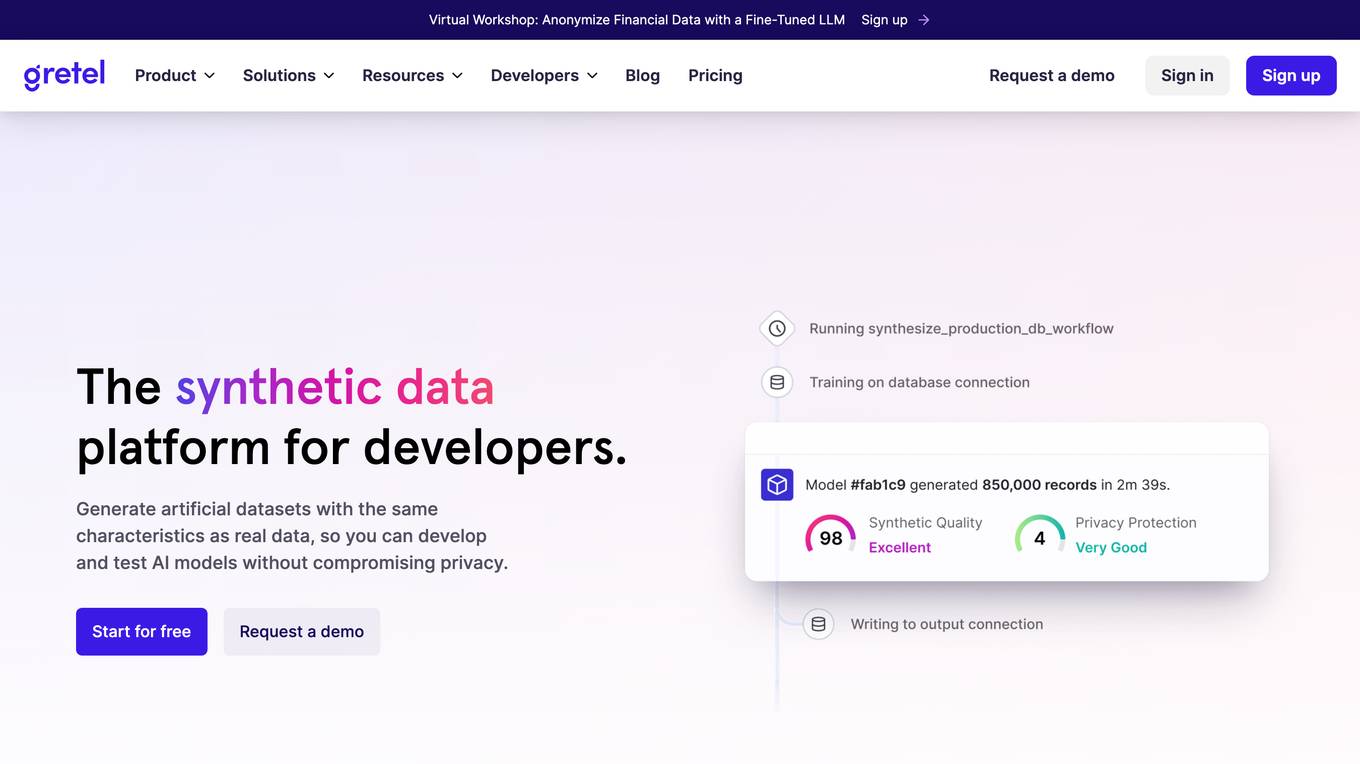
Synthetic Data Generation for Agentic AI
The website provides information on Synthetic Data Generation for Agentic AI, offering high-quality, domain-specific synthetic data to accelerate the development of agentic workflows. It explains the technical implementation, benefits, and usage of synthetic data in training specialized agentic systems. The site also showcases related use cases, quick links for further exploration, and detailed steps for generating synthetic data.
1 - Open Source AI Tools
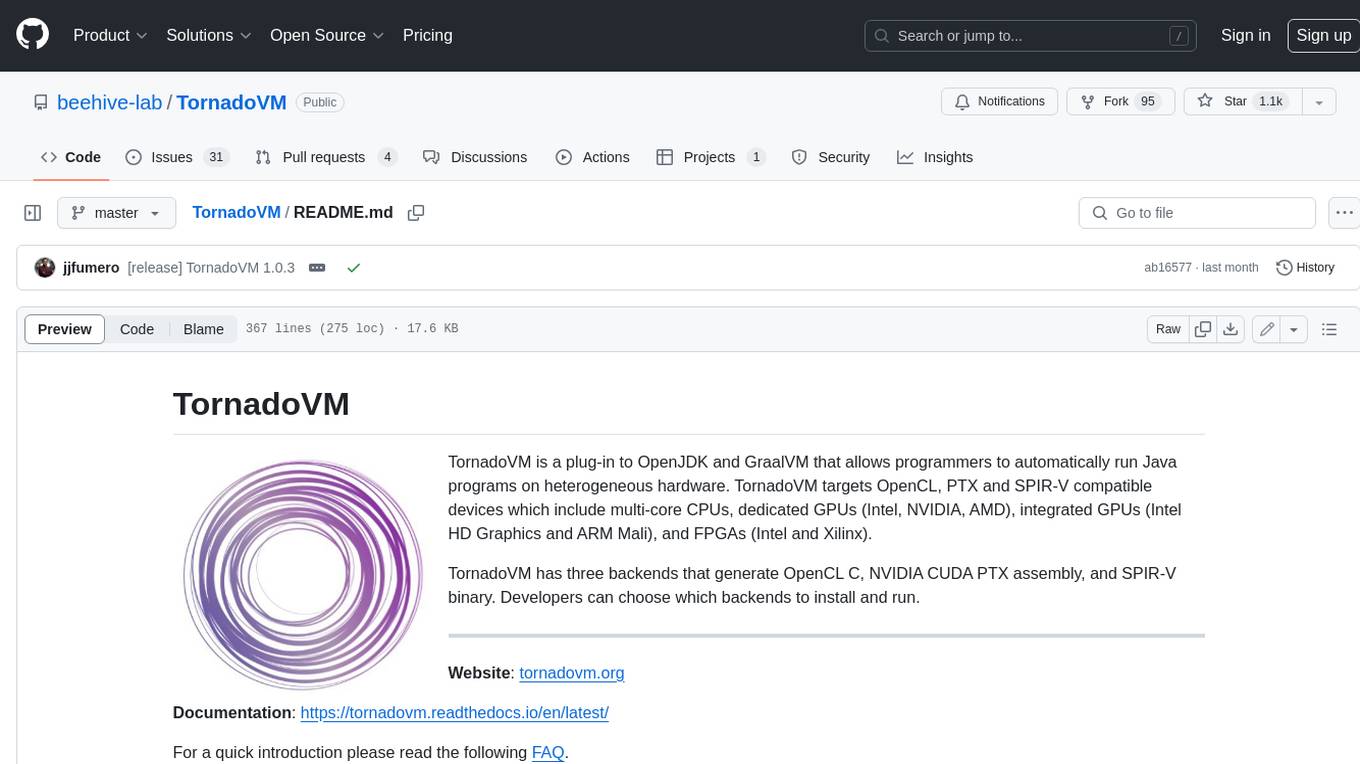
TornadoVM
TornadoVM is a plug-in to OpenJDK and GraalVM that allows programmers to automatically run Java programs on heterogeneous hardware. TornadoVM targets OpenCL, PTX and SPIR-V compatible devices which include multi-core CPUs, dedicated GPUs (Intel, NVIDIA, AMD), integrated GPUs (Intel HD Graphics and ARM Mali), and FPGAs (Intel and Xilinx).
7 - OpenAI Gpts
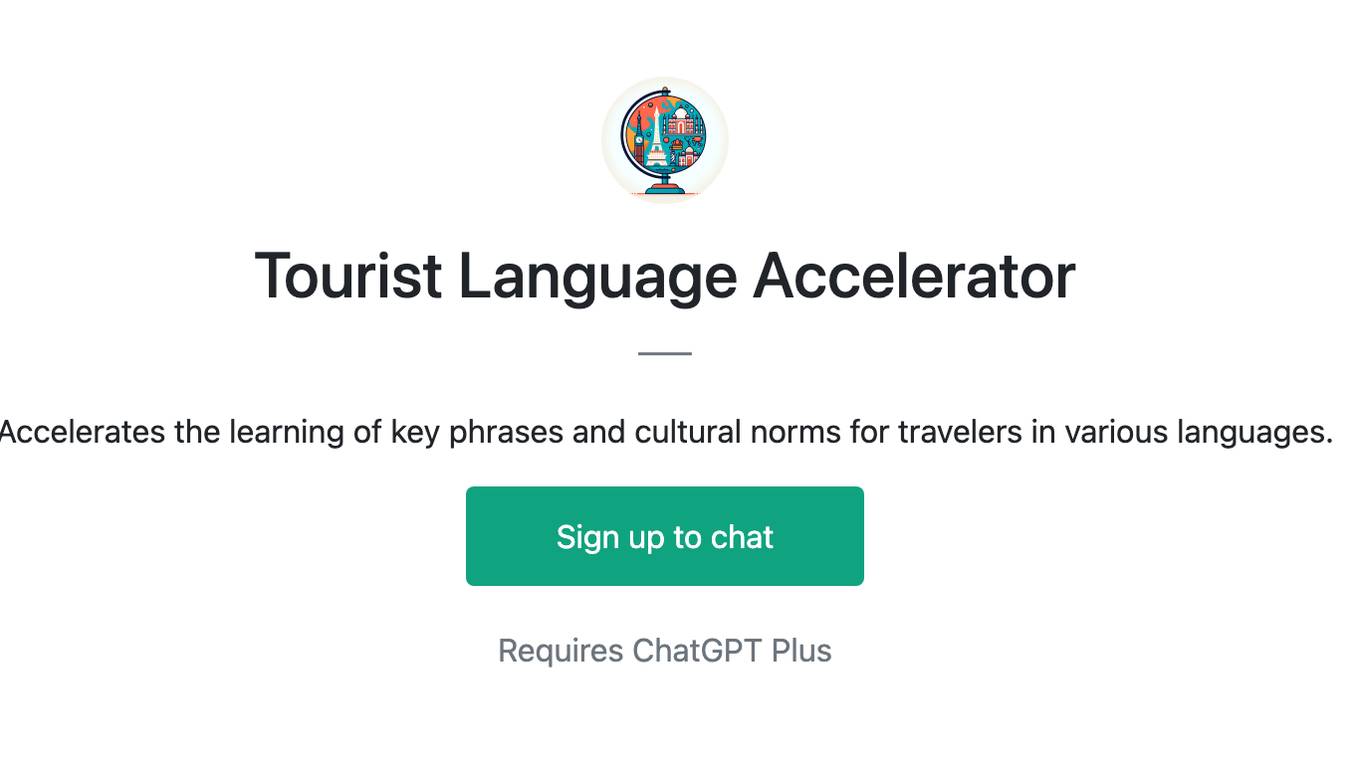
Tourist Language Accelerator
Accelerates the learning of key phrases and cultural norms for travelers in various languages.
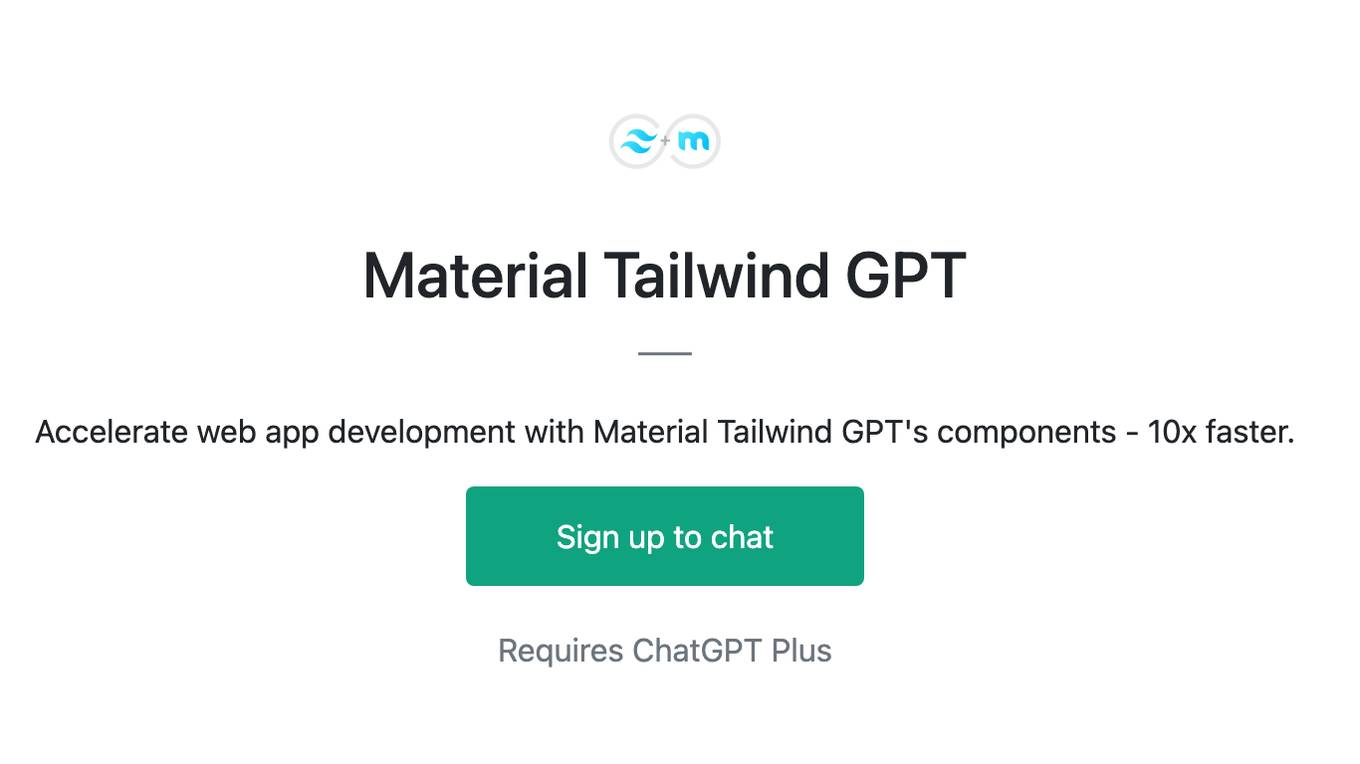
Material Tailwind GPT
Accelerate web app development with Material Tailwind GPT's components - 10x faster.

Digital Entrepreneurship Accelerator Coach
The Go-To Coach for Aspiring Digital Entrepreneurs, Innovators, & Startups. Learn More at UnderdogInnovationInc.com.

24 Hour Startup Accelerator
Niche-focused startup guide, humorous, strategic, simplifying ideas.
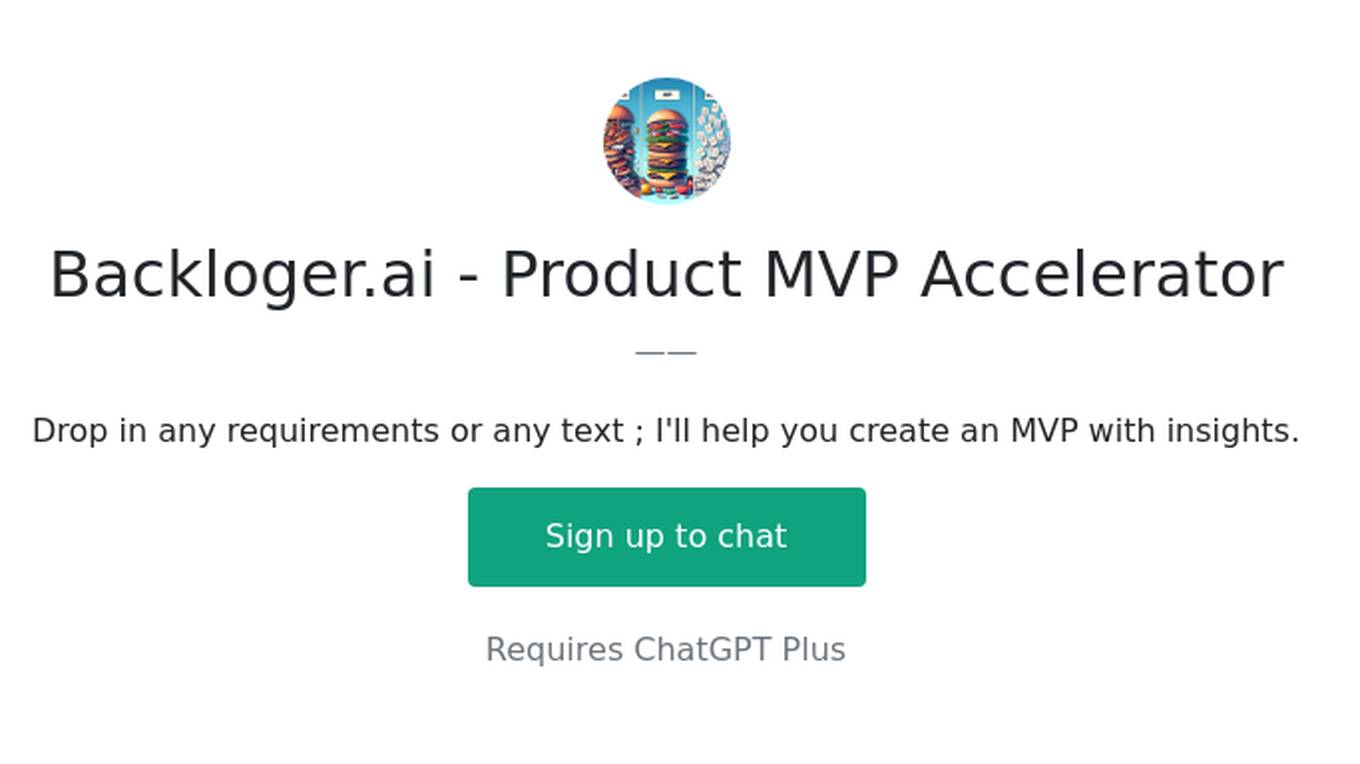
Backloger.ai - Product MVP Accelerator
Drop in any requirements or any text ; I'll help you create an MVP with insights.
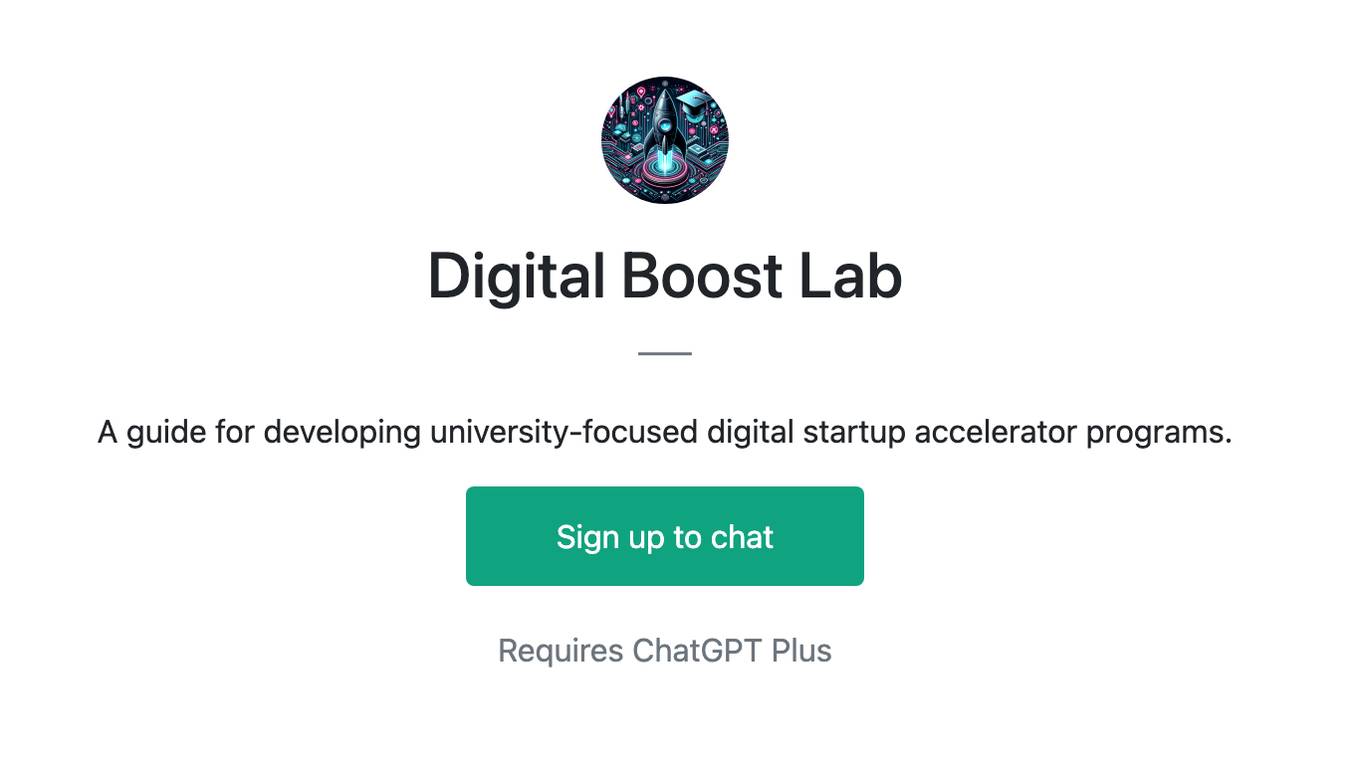
Digital Boost Lab
A guide for developing university-focused digital startup accelerator programs.
